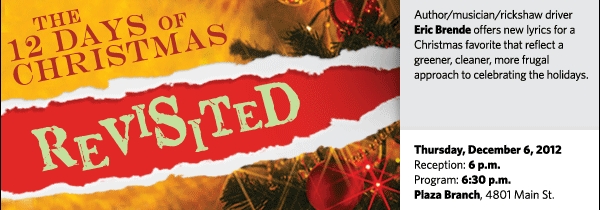Ever get the feeling that Christmas has morphed into something it was never supposed to be?
How did a celebration of joy, togetherness, love, and hope transmute into an extended shopping spree accounting for 25 percent of annual consumer spending?
Author/musician/rickshaw driver Eric Brende examines these questions through a re-write of of the perpetually popular The Twelve Days of Christmas, on Thursday, December 6, 2012, at 6:30 p.m. at the Plaza Branch, 4801 Main St.
Brende notes that the cavalcade of gifts described in the song from the 1780s (partridges, pear trees, gold rings, dancers dancing, etc.) today would cost $24,263.18.
His idea is to reverse the trend of the last 230 years by rewriting the lyrics. With a new set of gifts "The Twelve Days of Christmas" can now reflect a greener, cleaner, more frugal sensibility. Brende performs and discusses this updated version of a long-heralded carol.
A decade ago Brende - a graduate of MIT - moved with his wife to a community so primitive that even the Amish consider it antiquated. His goal was to determine if modern technology - cell phones, wide-screen technology, computers - were actually making our lives better.
Brende's year-long sojourn off the grid (no car, electric stove, refrigerator, running water) resulted in the 2004 book Better Off: Flipping the Switch on Technology. He found that with less technology he could shrink stress (and his waistline) while expanding happiness, health, and leisure.
"We've gotten to a point where technology is making life harder, not easier," he maintains. "Technology has displaced us from our own native capabilities."
Brende lives in St. Louis where he makes and markets Hermann Handmade Soap (based on his friends' family recipe). As the operator of St. Louis Rickshaw he also pedals passengers on tours of downtown St. Louis during large sporting and other downtown events that draw big pedestrian crowds.
Major funding for programs at the Kansas City Public Library is provided by a generous grant from the Ewing Marion Kauffman Foundation.
